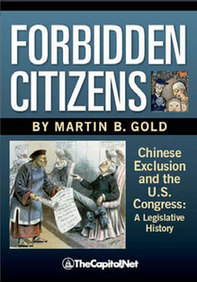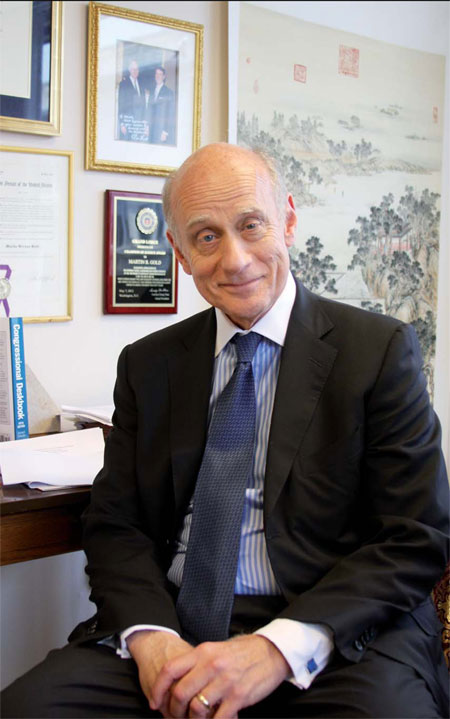Act of honor
Updated: 2012-07-20 12:23
By Tan Yingzi (China Daily)
|
|||||||||||
|
Martin Gold knew little about the story of Chinese exclusion before a friend raised it with him in Beijing in 2009. Tan Yingzi / China Daily |

Lawyer's pro bono work helps right historic injustice done to Chinese
On the afternoon of June 18, outside the floor of the US House of Representatives, Congresswoman Judy Chu and other Chinese-Americans celebrated the passage of an official apology for past laws excluding Chinese immigrants.
Among those celebrating was a smiling American who, unknown to many, had drawn on his love and respect for China and its people to play a key role in assisting the grassroots campaign to secure Congress' expression of regret.
Martin Gold, a partner of the law firm Covington & Burling LLP in Washington and co-chairman of its lobbying arm, had since 2010 led its pro bono effort on behalf of Chinese-Americans for Congress to redress discriminatory immigration laws enacted between 1879 and 1904.
Last October, the US Senate took the lead with its expression of regret.
"In my 40 years of professional life, I have never worked on a thing that has made me more proud than this," Gold told China Daily soon after publication of his book Forbidden Citizens: Chinese Exclusion and the U.S. Congress, A Legislative History.
The book tells of exclusion laws that violated the civil rights of Chinese immigrants by severely restricting their status and movement in the United States, barring them from becoming citizens, and for a decade, prohibiting Chinese laborers from entering the country.
Although the laws were repealed in 1943 once China had become a US ally in World War II, Congress had never formally acknowledged that an ethnic group was singled out and ostracized, abrogating America's founding principles.
Two years ago a petition signed by about 160 Chinese-American groups was delivered by hand to Chu, the first Chinese-American woman elected to Congress. It urged lawmakers on Capitol Hill to formally apologize for the laws, which were the first major tightening of immigration to the US.
A working group, the 1882 Project, was later set up to push for adoption of the House and Senate resolutions.
Like many Americans, Gold knew little about the exclusion story before the issue was raised during a lunch conversation with a friend in Beijing in 2009. At that time, the legislature in California had just apologized to Chinese-Americans for the state's role in carrying out the racist laws.
After researching the matter, Gold, the grandson of Russian Jews from what is now Belarus, was surprised and upset by the hardship inflicted by the laws and the wrongheaded thinking that produced them. Introduced by a Chinese friend, Gold got in touch with the 1882 Project and offered his help.
The lawyer and his Covington & Burling colleagues spent months poring over old congressional documents, mapping out strategy and lobbying Congress.
The biggest challenge the resolution project faced was the lack of knowledge in the current Congress about the history, Gold says. After informing members about the issue, many said they felt the same as Gold about the injustice.
But he then had to persuade them to apologize, and to do so right away.
"The indispensable element of this success is the community itself," he says. "Congress is a busy place and very little happens by accident. The community acted, organized and Congress looked at it, and was willing to act. It is a sad story with a happy ending, but nobody would bother to tell the story if it didn't matter to the community itself."
At the same time, Gold, who has written two books on Senate procedure, felt the urge to investigate the drafting of the exclusion laws.
"The distress Congress caused for multiple generations of Chinese - those who were directly affected as well as their families - is still real," he wrote in his latest work. "Shedding light on the past helps to ensure that such miscarriages do not recur."
Using senators' and representatives' own words, the book chronicles the sad and disturbing legislative history of the Chinese exclusion laws, with many passages transcribed from the debates, he says.
Though Congress expressed regret for passing the laws, the exclusion story remains unfamiliar to most Americans, including those of Chinese heritage, Gold says. He hopes his book, published on July 4, will help redress this.
Since first visiting China in 1998, Gold has developed a warm feeling toward its people and become committed to promoting exchanges between the country and the US.
He has been a guest lecturer at Beijing's Tsinghua University and the Foreign Studies University.
In 2006 President George W. Bush appointed Gold to the United States Commission for the Preservation of America's Heritage Abroad, a position through which he encountered the story of Jews in Shanghai. He led an effort in 2008 for official US recognition of Ho Feng Shan, a Chinese diplomat who rescued Austrian Jews from Nazi persecution during World War II.
To promote understanding of China, Gold has taken several delegations of former members of Congress to the Shanghai Jewish Refugees Museum and told them the story of Ho's humanitarianism.
Gold says the US historically has a European-centered view of the rest of the world and that, partly as a result, most Americans know little about China. But he believes this will change as the US-China relationship continues to develop.
Current lawmakers in Washington who are around Gold's age of 65 grew up with the Cold War and had little contact with China, he says, so it is natural that many hold stereotypes about the country.
But much has been done, on various levels, to remedy this, he says.
"We need to know the difference between Ming and Qing (dynasties); we need to understand what motivates Chinese people, what Confucianism means to them.
"We do not need to agree on everything, but we should understand each other."
tanyingzi@chinadailyusa.com
(China Daily 07/20/2012 page30)
Today's Top News
Rescuers race against time for quake victims
Telecom workers restore links
Coal mine blast kills 18 in Jilin
Intl scholarship puts China on the map
More bird flu patients discharged
Gold loses sheen, but still a safe bet
US 'turns blind eye to human rights'
Telecom workers restore links
Hot Topics
Lunar probe , China growth forecasts, Emission rules get tougher, China seen through 'colored lens', International board,
Editor's Picks

|

|

|

|

|

|






